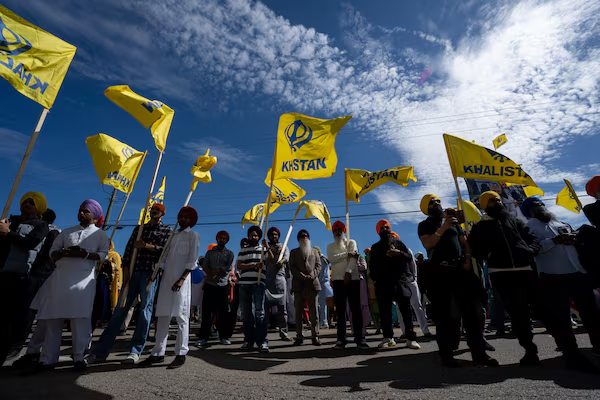Ottawa (Rajeev Sharma): Canada’s intelligence agency has raised alarms over a small faction of radical Khalistani activists allegedly operating within its borders, describing them as a continued national security threat. The Canadian Security Intelligence Service (CSIS) observed in its latest annual report to Parliament, citing concerns about the use of Canadian soil for promoting, financing, and organizing acts of violence aimed at India in pursuit of an independent Sikh state of Khalistan.
While emphasizing that the vast majority of Khalistan supporters in Canada advocate through peaceful and democratic means, CSIS warned that a minority of actors are engaging in more extreme activities. This is the first time since 2018 that the intelligence body has singled out Khalistani extremism in its annual public assessment.
The move comes at a time when Canada is seeking to repair strained diplomatic ties with India, which worsened following accusations from former Prime Minister Justin Trudeau in 2023 that Indian operatives were involved in the assassination of Canadian citizen and Khalistan advocate Hardeep Singh Nijjar. India has consistently denied involvement.
The CSIS report also named India as a persistent foreign interference actor, suggesting that New Delhi’s concerns over Khalistan-related activities may be influencing its covert operations in Canada.
Legal and Community Reactions
Balpreet Singh, legal counsel for the World Sikh Organization (WSO) of Canada, has raised concerns over the language used in the CSIS report. “There is no evidence suggesting Khalistani extremists pose a real threat to Canada,” Singh argued, pointing out that the report did not reference any attacks linked to Sikh extremism in 2024. He added, “India tends to label all Khalistan advocacy as terrorism, which misrepresents peaceful Sikh activism.”
In contrast, Andrew Kirsch, a former CSIS intelligence officer, asserted that the agency does not include such information lightly. “If they’re highlighting it, it’s serious,” he said, adding that threat evaluations are based on reliable sources and undergo rigorous internal scrutiny to avoid being influenced by disinformation campaigns.
Shifting Diplomatic Winds?
The report’s inclusion of Khalistani extremism has prompted speculation that it may be politically motivated as Canada attempts to ease tensions with India. Some Sikh leaders have interpreted this as Ottawa trying to placate New Delhi, particularly after Prime Minister Mark Carney extended an invitation to Indian Prime Minister Narendra Modi for this month’s G7 Summit in Alberta, a move that sparked protests from Sikh groups across the country.
“It feels like a betrayal,” said Gurpreet Sahota, editor-in-chief of Channel Punjabi. “Canada’s commitment to democratic rights shouldn’t be compromised for diplomacy.”
CSIS spokesperson Magali Hébert responded to criticism by affirming that the term “Canada-based Khalistani extremism” has long been part of the agency’s vocabulary. She added that a recent public inquiry into foreign interference referenced CSIS findings on Sikh extremism, while reiterating that the majority of Khalistan supporters are peaceful.
India’s High Commission has yet to issue a formal response, though official social media accounts referenced the 40th anniversary of the 1985 Air India Flight 182 bombing, carried out by Canada-based Khalistani extremists, as a sobering reminder of why global vigilance against extremism remains necessary.
As the debate over Khalistani activism, national security, and foreign interference intensifies, CSIS’s report highlights the complexities facing Canadian policymakers in balancing civil liberties, national interests, and international relations.

